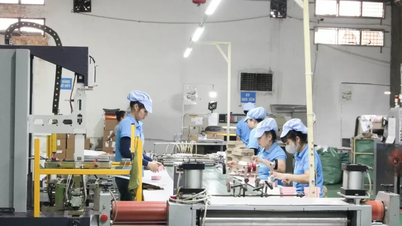In attracting FDI capital to Vietnam, high-value industries such as electronics, auto components, semiconductors and green technology are leading.
Vietnam's shift towards high value-added manufacturing, coupled with expanding logistics and data center capabilities, is boosting its position in the supply chain global. This is the assessment made in the Vietnam Industry Focus Report 2024: The New Wave by Savills Vietnam published on November 8.

According to Savills Vietnam, the success of the industry Vietnam industry is underpinned by a number of factors, including a dynamic workforce, favourable government policies, openness to trade, a strategic location, and continuous upgrading and improvement of infrastructure. High-value industries such as electronics and semiconductors are driving growth, shaping real estate demand and attracting regional investment.
Mr. Troy Griffiths, Deputy Director of Savills Vietnam, said that Vietnam has transformed from a traditional manufacturing process, with companies focusing on finding lower labor costs, to a more high-tech, specialized country with high production capacity.
With its competitive costs, strategic location and participation in numerous trade agreements, Vietnam is well positioned to capture this new wave of investment. As it integrates into global markets, Vietnam will play a key role in the future of Southeast Asia’s industry, maintaining its reputation as an ideal destination for industrial and logistics solutions.
In attracting FDI capital to Vietnam, high-value industries such as electronics, auto components, semiconductors and green technology are leading. Savills Vietnam said that key investing countries including South Korea, Singapore and Japan have highlighted the trend of shifting to high-tech, high-value manufacturing, accounting for about 63% of FDI capital, far surpassing the traditional low-cost manufacturing sector.
To consolidate the new wave of investment, Vietnam is boosting investment in infrastructure, spending 7% of GDP on key projects such as the North-South Expressway, Long Thanh International Airport and deep-water ports such as Cai Mep in Ba Ria-Vung Tau..., creating direct connections with Europe, America and Southeast Asia.
The Northern Key Economic Region benefits from strong infrastructure, including highways and major ports such as Hai Phong and Lach Huyen, enhancing its attractiveness for export industries.
The extensive port system of the Southern Key Economic Zone, especially the deep-water port of Cai Mep, enables direct shipping to international markets and reinforces Vietnam's role as a key logistics hub.
Mr. John Campbell, Director-Head of Industrial Real Estate at Savills Vietnam, emphasized that strong FDI inflows, strategic location, competitive costs, e-commerce growth, open trade policies and Vietnam's role in the global supply chain will be essential for the long-term supply and performance of the warehouse segment.
Going into specific analysis of investment attraction advantages, Savills Vietnam experts emphasized that with the development of the e-commerce industry and increased FDI, the demand for warehouses and ready-built industrial premises has increased sharply.
In 2024, ready-built (RB) factory and warehouse supply will increase by 31%, with occupancy rates exceeding 80% in key areas. Typically, the Southern region, with its logistics advantages, is favored due to its competitive costs and strategic location, serving both domestic and international customers.
At the same time, the Government's support for logistics development through investment in diverse forms of transport and specialized logistics zones helps promote growth, positioning Vietnam as a priority location for efficient and cost-effective industrial solutions.
“ Strong manufacturing exports have played a key role in Vietnam’s economic recovery this year. FDI inflows into value-added manufacturing have significantly boosted the country’s overall export growth, with electronics emerging as a major contributor ,” said John Campbell.
As the digital economy sweeps across Asia, Vietnam is emerging as a key market for data centers. Valued at $685 million in 2023, the Vietnamese data center market is expected to reach $1.4 billion by 2029, driven by rising demand for cloud computing, 5G, and IoT. The Vietnamese government’s Digital Transformation Program aims for 50% of businesses to operate digitally by 2025, underscoring Vietnam’s commitment to becoming a digital hub.
Savills Vietnam's report also stated that with its strategic location, large workforce and expanding infrastructure, Vietnam's industry is poised for continued growth.
In 2025, high-value industries and FDI are expected to continue to drive steady demand for industrial real estate thanks to focused investment policies, a series of strong infrastructure projects and the ongoing shift in global manufacturing (China +1 strategy).
At the same time, Vietnam’s commitment to public investment and extensive network of trade agreements will further strengthen its competitive advantage and position Vietnam as a focal point in the regional supply chain.
Source





![[Photo] Prime Minister Pham Minh Chinh chairs conference on anti-smuggling, trade fraud, and counterfeit goods](https://vphoto.vietnam.vn/thumb/1200x675/vietnam/resource/IMAGE/2025/5/14/6cd67667e99e4248b7d4f587fd21e37c)




























































































Comment (0)